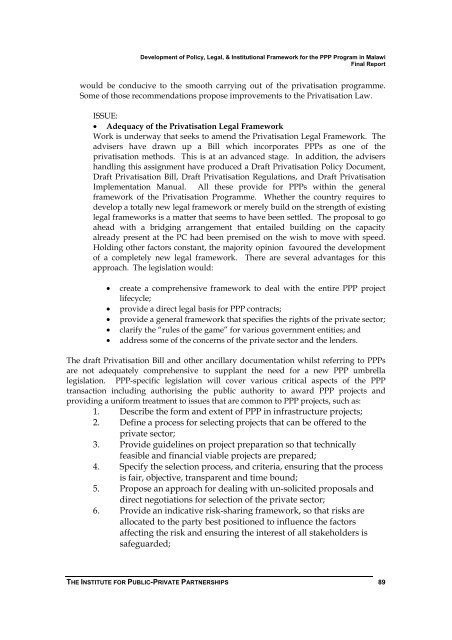Development of Policy, Legal, and Insitutional Framework for - ppiaf
Development of Policy, Legal, and Insitutional Framework for - ppiaf
Development of Policy, Legal, and Insitutional Framework for - ppiaf
You also want an ePaper? Increase the reach of your titles
YUMPU automatically turns print PDFs into web optimized ePapers that Google loves.
<strong>Development</strong> <strong>of</strong> <strong>Policy</strong>, <strong>Legal</strong>, & Institutional <strong>Framework</strong> <strong>for</strong> the PPP Program in Malawi<br />
Final Report<br />
would be conducive to the smooth carrying out <strong>of</strong> the privatisation programme.<br />
Some <strong>of</strong> those recommendations propose improvements to the Privatisation Law.<br />
ISSUE:<br />
Adequacy <strong>of</strong> the Privatisation <strong>Legal</strong> <strong>Framework</strong><br />
Work is underway that seeks to amend the Privatisation <strong>Legal</strong> <strong>Framework</strong>. The<br />
advisers have drawn up a Bill which incorporates PPPs as one <strong>of</strong> the<br />
privatisation methods. This is at an advanced stage. In addition, the advisers<br />
h<strong>and</strong>ling this assignment have produced a Draft Privatisation <strong>Policy</strong> Document,<br />
Draft Privatisation Bill, Draft Privatisation Regulations, <strong>and</strong> Draft Privatisation<br />
Implementation Manual. All these provide <strong>for</strong> PPPs within the general<br />
framework <strong>of</strong> the Privatisation Programme. Whether the country requires to<br />
develop a totally new legal framework or merely build on the strength <strong>of</strong> existing<br />
legal frameworks is a matter that seems to have been settled. The proposal to go<br />
ahead with a bridging arrangement that entailed building on the capacity<br />
already present at the PC had been premised on the wish to move with speed.<br />
Holding other factors constant, the majority opinion favoured the development<br />
<strong>of</strong> a completely new legal framework. There are several advantages <strong>for</strong> this<br />
approach. The legislation would:<br />
<br />
<br />
<br />
<br />
<br />
create a comprehensive framework to deal with the entire PPP project<br />
lifecycle;<br />
provide a direct legal basis <strong>for</strong> PPP contracts;<br />
provide a general framework that specifies the rights <strong>of</strong> the private sector;<br />
clarify the “rules <strong>of</strong> the game” <strong>for</strong> various government entities; <strong>and</strong><br />
address some <strong>of</strong> the concerns <strong>of</strong> the private sector <strong>and</strong> the lenders.<br />
The draft Privatisation Bill <strong>and</strong> other ancillary documentation whilst referring to PPPs<br />
are not adequately comprehensive to supplant the need <strong>for</strong> a new PPP umbrella<br />
legislation. PPP-specific legislation will cover various critical aspects <strong>of</strong> the PPP<br />
transaction including authorising the public authority to award PPP projects <strong>and</strong><br />
providing a uni<strong>for</strong>m treatment to issues that are common to PPP projects, such as:<br />
1. Describe the <strong>for</strong>m <strong>and</strong> extent <strong>of</strong> PPP in infrastructure projects;<br />
2. Define a process <strong>for</strong> selecting projects that can be <strong>of</strong>fered to the<br />
private sector;<br />
3. Provide guidelines on project preparation so that technically<br />
feasible <strong>and</strong> financial viable projects are prepared;<br />
4. Specify the selection process, <strong>and</strong> criteria, ensuring that the process<br />
is fair, objective, transparent <strong>and</strong> time bound;<br />
5. Propose an approach <strong>for</strong> dealing with un-solicited proposals <strong>and</strong><br />
direct negotiations <strong>for</strong> selection <strong>of</strong> the private sector;<br />
6. Provide an indicative risk-sharing framework, so that risks are<br />
allocated to the party best positioned to influence the factors<br />
affecting the risk <strong>and</strong> ensuring the interest <strong>of</strong> all stakeholders is<br />
safeguarded;<br />
THE INSTITUTE FOR PUBLIC-PRIVATE PARTNERSHIPS 89
















